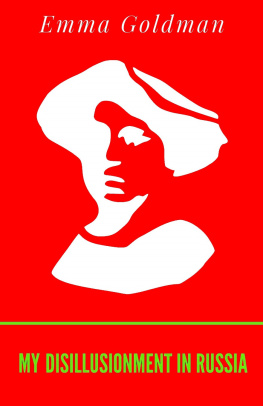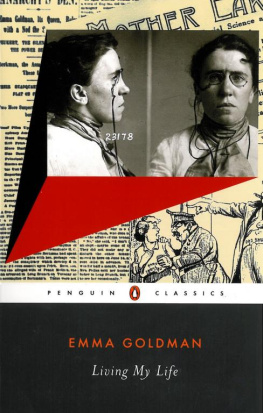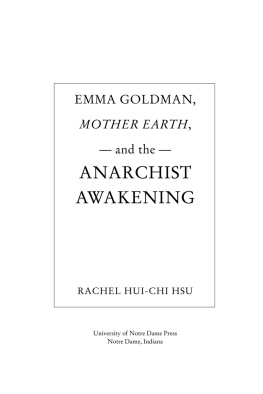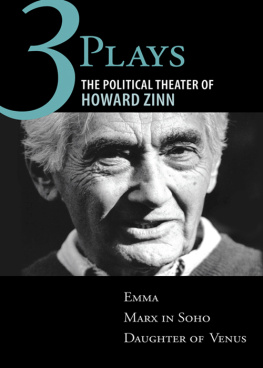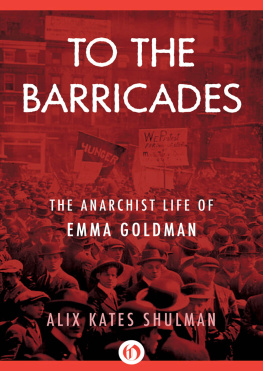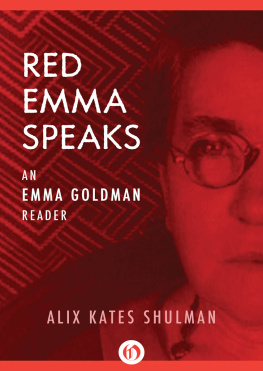Emma Goldman - My Further Disillusionment in Russia
Here you can read online Emma Goldman - My Further Disillusionment in Russia full text of the book (entire story) in english for free. Download pdf and epub, get meaning, cover and reviews about this ebook. year: 1924, genre: Art. Description of the work, (preface) as well as reviews are available. Best literature library LitArk.com created for fans of good reading and offers a wide selection of genres:
Romance novel
Science fiction
Adventure
Detective
Science
History
Home and family
Prose
Art
Politics
Computer
Non-fiction
Religion
Business
Children
Humor
Choose a favorite category and find really read worthwhile books. Enjoy immersion in the world of imagination, feel the emotions of the characters or learn something new for yourself, make an fascinating discovery.

- Book:My Further Disillusionment in Russia
- Author:
- Genre:
- Year:1924
- Rating:5 / 5
- Favourites:Add to favourites
- Your mark:
- 100
- 1
- 2
- 3
- 4
- 5
My Further Disillusionment in Russia: summary, description and annotation
We offer to read an annotation, description, summary or preface (depends on what the author of the book "My Further Disillusionment in Russia" wrote himself). If you haven't found the necessary information about the book — write in the comments, we will try to find it.
My Further Disillusionment in Russia — read online for free the complete book (whole text) full work
Below is the text of the book, divided by pages. System saving the place of the last page read, allows you to conveniently read the book "My Further Disillusionment in Russia" online for free, without having to search again every time where you left off. Put a bookmark, and you can go to the page where you finished reading at any time.
Font size:
Interval:
Bookmark:
The annals of literature tell of books expurgated, of whole chapters eliminated or changed beyond recognition. But I believe it has rarely happened that a work should be published with more than a third of it left out and without the reviewers being aware of the fact. This doubtful distinction has fallen to the lot of my work on Russia.
The story of that painful experience might well make another chapter, but for the present it is sufficient to give the bare facts of the case.
My manuscript was sent to the original purchaser in two parts, at different times. Subsequently the publishing house of Doubleday, Page & Co. bought the rights to my work, but when the first printed copies reached me I discovered to my dismay that not only had my original title, My Two Years in Russia, been changed to My Disillusionment in Russia, but that the last twelve chapters were entirely missing, including my Afterword which is, at least to myself, the most vital part.
There followed an exchange of cables and letters, which gradually elicited the fact that Doubleday, Page & Co. had secured my MSS. from a literary agency in the good faith that it was complete. By some conspiracy of circumstances the second instalment of my work either failed to reach the original purchaser or was lost in his office. At any rate, the book was published without any ones suspecting its incompleteness.
The present volume contains the chapters missing from the first edition, and I deeply appreciate the devotion of my friends who have made the appearance of this additional issue possible in justice to myself and to my readers.
The adventures of my MSS. are not without their humorous side, which throws a peculiar light on the critics. Of almost a hundred American reviewers of my work only two sensed its incompleteness. And, incidentally, one of them is not a regular critic but a librarian. Rather a reflection on professional acumen or conscientiousness.
It were a waste of time to notice the criticism of those who have either not read the book or lacked the wit to realize that it was unfinished. Of all the alleged reviews only two deserve consideration as written by earnest and able men: those of Henry Alsberg and H. L. Mencken.
Mr. Alsberg believes that the present title of my book is more appropriate to its contents than the name I had chosen. My disillusionment, he asserts, is not only with the Bolsheviki but with the Revolution itself. In support of this contention he cites Bukharins remark to the effect that a revolution cannot be accomplished without terror, disorganization, and even wanton destruction, any more than an omelette can be made without breaking the eggs. But it seems not to have occurred to Mr. Alsberg that, though the breaking of the eggs is necessary, no omelette can be made if the yolk be thrown away. And that is precisely what the Communist Party did to the Russian Revolution. For the yolk they substituted Bolshevism, more specifically Leninism, with the result as shown in my book a result that is gradually being realized as an entire failure by the world at large.
Mr. Alsberg also believes that it was not grim necessity, the driving need to preserve not the Revolution but the remnants of civilization, which forced the Bolsheviki to lay hands on every available weapon, the Terror, the Tcheka, suppression of free speech and press, censorship, military conscription, conscription of labour, requisitioning of peasants crops, even bribery and corruption. Mr. Alsberg evidently agrees with me that the Communists employed all these methods; and that, as he himself states, the means largely determines the end a conclusion the proof and demonstration of which are contained in my book. The only mistake in this viewpoint, however a most vital one is the assumption that the Bolsheviki were forced to resort to the methods referred to in order to preserve the remnants of civilization. Such a view is based on an entire misconception of the philosophy and practice of Bolshevism. Nothing can be further from the desire or intention of Leninism that the preservation of the remnants of civilization. Had Mr. Alsberg said instead the preservation of the Communist dictatorship, of the political absolutism of the Party, he would have come nearer the truth, and we should have no quarrel on the matter. We must not fail to consider that the Bolsheviki continue to employ exactly the same methods to-day as they did in what Mr. Alsberg calls the moments of grim necessity, in 1919, 1920, and 1921.
We are in 1924. The military fronts have long ago been liquidated; internal counterrevolution is suppressed; the old bourgeoisie is eliminated; the moments of grim necessity are past. In fact, Russia is being politically recognized by various governments of Europe and Asia, and the Bolsheviki are inviting international capital to come to their country whose natural wealth, as Tchicherin assures the world capitalists, is waiting to be exploited. The moments of grim necessity are gone, but the Terror, the Tcheka, suppression of free speech and press, and all the other Communist methods enumerated by Mr. Alsberg still remain in force. Indeed, they are being applied even more brutally and barbarously since the death of Lenin. Is it to preserve the remnants of civilization, as Mr. Alsberg claims, or to strengthen the weakening Party dictatorship?
Mr. Alsberg charges me with believing that had the Russians made the Revolution la Bakunin instead of la Marx the result would have been different and more satisfactory. I plead guilty to the charge. In truth, I not only believe so; I am certain of it. The Russian Revolution more correctly, Bolshevik methods conclusively demonstrated how a revolution should not be made. The Russian experiment has proven the fatality of a political party usurping the functions of the revolutionary people, of an omnipotent State seeking to impose its will upon the country, of a dictatorship attempting to organize the new life. But I need not repeat here the reflections summed up in my concluding chapter. Unfortunately they did not appear in the first edition of my work. Otherwise Mr. Alsberg might perhaps have written differently.
Mr. Mencken in his review believes me a prejudiced witness, because I an Anarchist am opposed to government, whatever its form. Yet the whole first part of my book entirely disproves the assumption of my prejudice. I defended the Bolsheviki while still in America, and for long months in Russia I sought every opportunity to cooperate with them and to aid in the great task of revolutionary upbuilding. Though an Anarchist and an anti-governmentalist, I had not come to Russia expecting to find my ideal realized. I saw in the Bolsheviki the symbol of the Revolution and I was eager to work with them in spite of our differences. However, if lack of aloofness from the actualities of life means that one cannot judge things fairly, then Mr Mencken is right. One could not have lived through two years of Communist terror, of a rgime involving the enslavement of the whole people, the annihilation of the most fundamental values, human and revolutionary, of corruption and mismanagement, and yet have remained aloof or impartial in Mr. Menckens sense. I doubt whether Mr. Mencken, though not an Anarchist, would have done so. Could he, being human?
In conclusion, the present publication of the chapters missing in the first edition comes at a very significant period in the life of Russia. When the Nep, Lenins new economic policy, was introduced, there rose the hope of a better day, of a gradual abolition of the policies of terror and persecution. The Communist dictatorship seemed inclined to relax its strangle-hold upon the thoughts and lives of the people. But the hope was short-lived. Since the death of Lenin the Bolsheviki have returned to the terror of the worst days of their rgime. Despotism, fearing for its power, seeks safety in bloodshed. More timely even than in 1922 is my book to-day.
Font size:
Interval:
Bookmark:
Similar books «My Further Disillusionment in Russia»
Look at similar books to My Further Disillusionment in Russia. We have selected literature similar in name and meaning in the hope of providing readers with more options to find new, interesting, not yet read works.
Discussion, reviews of the book My Further Disillusionment in Russia and just readers' own opinions. Leave your comments, write what you think about the work, its meaning or the main characters. Specify what exactly you liked and what you didn't like, and why you think so.

